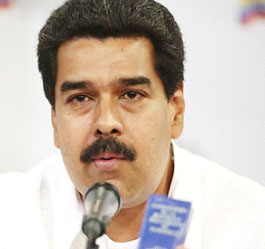CARACAS, (Reuters) – Venezuela yesterday presented a timeline for a potential recall vote against President Nicolas Maduro that appeared to make a vote unlikely this year, a move slammed by the opposition as an effort to favour the ruling Socialist Party.

The timing of the recall is critical because recalling Maduro in 2016 will trigger fresh elections. Polls suggest he would lose given discontent over product shortages and triple-digit inflation.
A recall next year, however, would lead Maduro to be replaced by his vice president, who would serve the remainder of his term through early 2019.
A petition drive to collect signatures from 20 percent of registered voters, the next step in the recall process, would “probably” take place in late October, National Elections Council President Tibisay Lucena said in televised comments, adding this would depend on whether the opposition has properly requested the vote.
Lucena said the October date was just an estimate, and the precise date would not be known for several weeks.
Under the time frame presented, a referendum could not take place before December at the earliest. More likely, it would take place in mid-February, the end of the 90-day period in which the council must call the vote.
During the current recall effort, the council has always taken the maximum amount of time allowed under regulation.
Opposition leaders swiftly condemned the announcement, saying the elections council was stalling the process for Maduro’s benefit. The council has been accused for years of favoring the Socialist Party.
“An exercise in cynicism and lies by Ms. Lucena! Believing that all Venezuelans are fools!” tweeted Henrique Capriles, former presidential candidate and opposition leader who has led the recall referendum effort. “It is our constitutional right and we will insist on it.”
Opposition leaders are calling for a nationwide march to the capital of Caracas on Sept. 1 to demand the council set a firm date for the next signature drive.
The process could be slowed further if the council rejects significant portions of signatures as it has in the past.
Opposition leaders say that during a preliminary signature drive in July for this same recall effort, the council rejected more than half a million signatures for reasons ranging from unclear handwriting to smudged fingerprints.
Socialist Party leaders have dismissed the recall effort as fraudulent and noted that the elections council found nearly 10,000 signatures corresponding to people who were deceased.





